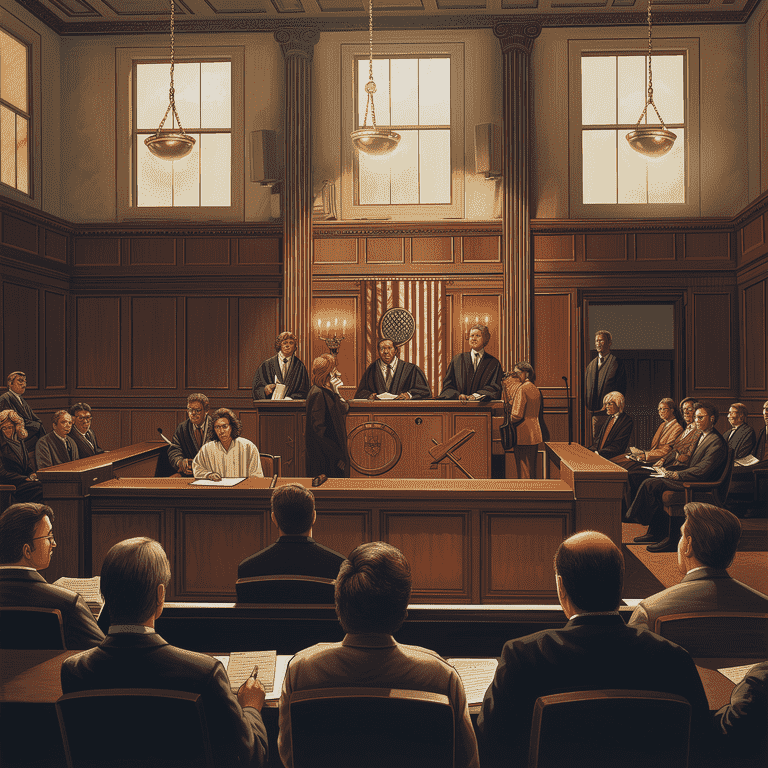Welcome to the world of courtroom etiquette in Nevada!
Understanding the dos and don’ts in a courtroom setting is crucial, whether you’re a first-timer or need a refresher.
This guide is designed to help you navigate the nuances of behavior and communication within Nevada’s courts. It will ensure you make a positive impression.

Like any other, Nevada’s court system has unique protocols and expectations. Every detail matters, from how you dress to how you address the judge. Let’s dive in and explore these essentials.
We’ll make your courtroom experience as smooth and respectful as possible.
Understanding the Basics of Courtroom Behavior
Dress Code for Nevada Courts
Guidelines for Men and Women
Dressing appropriately for court is not just about making a good impression. It’s also a sign of respect for the judicial system. Here’s a quick rundown:
Men: Think business attire. A suit and tie are ideal, but a collared shirt and slacks will do if you don’t have a suit. Avoid sneakers, hats, and flashy accessories.
Women: Business attire is also recommended. A conservative dress or a blouse with a skirt or slacks is appropriate. Avoid overly casual items like flip-flops or tank tops.
Exceptions and Special Circumstances
Sometimes, you may not have access to formal attire. Or, there might be cultural or religious considerations. In such cases, aim for neat, clean, and as formal as possible within your means or customs.
Punctuality and Scheduling
Consequences of Tardiness
Being late can be interpreted as disrespect. It may influence the judge’s perception of your commitment. In worst-case scenarios, it could lead to a rescheduling or even a default judgment against you.
How to Handle Delays or Schedule Changes
Life happens, and sometimes delays are unavoidable. If you foresee being late or missing a court date, contact your attorney or the court clerk as soon as possible. Inform them and seek advice.

Communication in the Courtroom
Addressing the Judge and Court Staff
Proper Titles and Forms of Address
Always use “Your Honor” when addressing the judge. It’s a sign of respect and acknowledgment of their role. For other court staff, “Mr.”, “Ms.”, or “Mrs.” followed by their last name is appropriate.
Understanding Courtroom Hierarchy
Knowing who is who in the courtroom is essential. From the judge to the bailiff, each has a specific role and should be addressed accordingly.
Speaking Etiquette
Clarity and Volume of Speech
Speak clearly and audibly. Mumbling or speaking too softly can be seen as a lack of confidence or preparedness.
Avoiding Slang and Informal Language
Courtrooms are formal settings, and the language used should reflect that. Avoid slang, jargon, and casual phrases. Stick to standard, polite English.
Non-Verbal Communication
Importance of Eye Contact and Posture
Your body speaks volumes before you even utter a word. Maintain eye contact when speaking to show confidence and honesty. A good posture – sitting or standing straight – exudes respect and attentiveness.
Reading the Room: Gauging Courtroom Dynamics
Be aware of the mood and dynamics of the room. Mirroring the formality and seriousness of those around you can help you blend in. It can also help you respect the court’s atmosphere.
Maintaining Composure Under Pressure
Stress Management Techniques
Courtrooms can be stressful, but keeping your cool is crucial. Practice deep breathing or positive visualization before your appearance to stay calm.
Appropriate Emotional Responses
It’s natural to feel emotional, but self-control is vital. Display emotions appropriately. It’s okay to show concern or seriousness, but avoid extreme displays of anger or distress.

Courtroom Procedures and Protocols
Understanding the Order of Proceedings
Overview of a Typical Court Session
A typical court session in Nevada might follow this sequence:
Opening statements (if any)
Presentation of evidence
Witness testimonies
Closing arguments
Role of Different Courtroom Participants
Everyone in the courtroom has a role:
Judge: Oversees the proceedings and makes legal decisions.
Attorneys: Present cases for their clients.
Bailiff: Maintains order and security.
Court Reporter: Records the proceedings.
Witnesses: Provide testimonies.
Compliance with Courtroom Rules
Electronic Devices and Recording Policies
Turn off your phone! Recording devices are usually prohibited unless explicitly allowed by the court.
Documentation and Evidence Handling
If you have documents or evidence, handle them properly:
Only present them when instructed.
Pass them to the bailiff or attorney, not directly to the judge.
To make a respectful and effective court appearance in Nevada, it’s essential to navigate the intricacies of body language, demeanor, and courtroom procedures. Remember, your actions and reactions, both verbal and non-verbal, significantly contribute to the proceedings. Stay composed, respectful, and aware of the courtroom’s protocols. Stay

Respect for the Court and Legal Process
Decorum and Professionalism
Respecting Opposing Counsel and Witnesses
In the courtroom, everyone deserves respect. It doesn’t matter what their role or stance in the case is. Here’s how:
Listen attentively when others speak.
Avoid interrupting or making dismissive gestures.
Maintain a professional demeanor, even if you disagree.
Demonstrating Respect for the Court’s Decisions
The judge’s decision, whether favorable or not, must be met with respect. Nodding in acknowledgment or a simple “Thank you, Your Honor” reflects well on you.
Cultural Sensitivity and Inclusivity
Accommodating Diverse Backgrounds and Needs
Courts in Nevada, like many places, serve a diverse community. Embrace this diversity by:
Being patient with non-native English speakers.
Showing respect for cultural differences in dress or behavior.
Avoiding assumptions based on appearance or accent.
Language and Disability Access
If you or someone else in the court needs language interpretation or disability accommodations, inform the court in advance. Courts are required to provide necessary services to ensure fair access.
This section emphasizes the importance of respect, professionalism, and inclusivity in the courtroom. Your behavior and attitude towards the court, its participants, and its decisions play a crucial role in upholding the dignity and fairness of the legal process. Adhering to these guidelines contributes to a respectful and just court environment.
Why You Have Not Hired a Felony Defense Attorney Yet
Watch this short video to take the next big step toward defending your rights against a felony charge.

Breaking It All Down for You
Thank you for taking the time to familiarize yourself with these essential aspects of courtroom etiquette in Nevada. Your understanding and adherence to these principles can significantly impact your court experience.

Frequently Asked Questions
Can I bring personal items into the courtroom, like bags or briefcases?
Yes, you can usually bring personal items, but they may be subject to search. It’s advisable to bring only essentials to avoid disruptions.
What should I do if I don’t understand something during the proceedings?
If you’re a party in the case, quietly ask your attorney for clarification. If you’re a spectator, you may need to wait until after the proceedings to seek clarification.
Are there any specific rules for taking notes in court?
Taking notes is generally allowed, but do so quietly. Avoid using electronic devices unless you’ve received permission, as they can be distracting.
How do I know where to sit in the courtroom?
Your attorney will guide you if you’re a party in the case. Spectators should use the public seating areas, usually at the back of the courtroom.
Is it acceptable to bring children to court?
While not encouraged, if you must bring a child, ensure they can remain quiet and not disrupt the proceedings. Some courts have specific rules about children’s presence.
What happens if I accidentally violate a courtroom rule?
Minor accidental violations, like a phone ringing, are usually met with a simple warning. However, repeated or severe violations can lead to being asked to leave. They can even result in contempt of court charges.
Can I leave the courtroom during a session if necessary?
Yes, but do so quietly and discreetly. It’s best to wait for a break in the proceedings.
Is food or drink allowed in the courtroom?
Generally, food and drinks are not allowed in courtrooms. It’s best to have your meals before or after your court appearance.
What should I do if I feel ill or have a medical emergency in court?
Notify a court officer or bailiff immediately. They will assist you and ensure you receive appropriate care.
How do I address other parties involved in the case, like witnesses or the opposing counsel?
Refer them formally, using Mr., Ms., or their professional titles. Avoid personal or informal addresses unless instructed otherwise by the court.

Glossary
Bailiff: A court officer responsible for maintaining order security and assisting the judge and court staff.
Closing Arguments: The final statements made by each party’s attorney, summarizing the evidence and making a final plea to the judge or jury.
Contempt of Court: An act of disobedience or disrespect towards the court, its officers, or the formal trial process, which can lead to penalties.
Court Clerk: A court official responsible for maintaining the records of a court and assisting in the administration of court proceedings.
Court Reporter: A person transcribes spoken or recorded speech into written form, creating official transcripts of court proceedings.
Defendant: An individual, company, or institution sued or accused in a court of law.
Electronic Devices Policy: The rules governing electronic devices like smartphones and laptops in a courtroom.
Evidence: Anything used to demonstrate the truth of an assertion in court, including physical proof, testimony, documents, and more.
Judge: An official appointed to decide cases in a court of law.
Opening Statements: Initial statements by each party’s attorney outlining the case and their position.
Plaintiff: A person who brings a case against another in a court of law.
Proceedings: The formal steps or actions taken as part of the legal process in a court.
Spectator: A person who observes the proceedings in court but is not directly involved in the case.
Testimony: A formal written or spoken statement in court, usually under oath.
Witness: A person who gives testimony, often based on their direct knowledge or involvement.
Additional Resources for You

In addition to providing top-notch legal representation, our lead attorney, Molly Rosenblum Allen, Esq., has developed a range of informative resources to assist you during challenging times. These resources offer in-depth insights into various legal topics, ensuring you’re well-informed and prepared. Here’s a list of the resources available:
- Double Jeopardy: Gain a thorough understanding of this complex legal concept and its implications on your case. Read more
- Hung Jury: Discover what happens when a jury cannot reach a unanimous decision and how it affects your trial. Explore further
- Circumstantial Evidence: Learn how indirect evidence can be used in court and its potential impact on your case. Learn more
- Indicted vs Charged: Understand the differences between being indicted and being charged, and what each means for your legal situation. Read more
- Difference Between Jail and Prison: Get clarity on the distinctions between these two types of detention facilities and what it means for you or your loved ones. Discover the differences
- What are Miranda Rights: Understand your rights when being detained or interrogated by the police. Learn about your rights
- How to Check if You Have an Outstanding Warrant: Find out the steps you need to take to check for any outstanding warrants against you. Check here
- What to Look for in a Criminal Defense Lawyer: Know the key qualities and qualifications you should consider when choosing your legal representation. Read more
- Possible Ways to Reduce a Felony Charge: Explore the strategies that might be available to lessen the severity of a felony charge. Learn how
- Should You Accept a Plea Bargain: Understand the pros and cons of accepting a plea bargain and how it can impact your case. Make an informed decision
We encourage you to utilize these resources to educate yourself and make informed decisions regarding your legal matters.

Offsite Resources You May Find Helpful
Here are several offsite resources that you may find useful, related to courtroom etiquette, legal proceedings, and understanding the law:
American Bar Association (ABA): A leading national organization providing resources on various legal topics, including courtroom conduct and legal ethics. Visit ABA
FindLaw: Offers a wealth of information on different aspects of the law, including detailed explanations of legal procedures and citizens’ legal rights. Explore FindLaw
Justia: Provides free access to a wide range of legal resources, including case law and statutes, which can help you understand the legal landscape better. Check out Justia
NOLO: Known for its easy-to-understand legal articles, guides, and resources, NOLO is a great place for those unfamiliar with legal jargon and procedures. Discover NOLO
LegalZoom: Offers a range of legal resources and services, particularly useful for those needing guidance on more practical aspects of legal processes. Visit LegalZoom
The National Center for State Courts (NCSC): Provides resources and information specifically about the court systems, which can be helpful for understanding state-specific court procedures like those in Nevada. Explore NCSC
United States Courts: The official website of the federal judiciary, offering a wealth of information about federal court procedures, which can be a good reference point for understanding court etiquette and processes. Check out United States Courts
Each of these resources offers a unique perspective or set of information that can be extremely helpful for understanding the legal system and preparing for court appearances.

A Special Message From Our Lead Attorney
Why You Might Need a Lawyer

Molly Rosenblum, Esq
Dear Reader,
Thank you so much for taking the time to go through our resources. I hope you found them informative and helpful. They explain the complexities of the legal system, especially courtroom etiquette and proceedings in Nevada.
If you are ready to take the next step in addressing your legal situation, my team and I at The Rosenblum Allen Law Firm are here to assist you. We understand that each case is unique and requires dedicated attention and expertise.
Please don’t hesitate to reach out to us. You can call us at (702) 433-2889 to discuss how we can support you and get the ball rolling on your situation.
I am looking forward to the opportunity to work with you.
Warm regards,
Molly Rosenblum, Esq.


